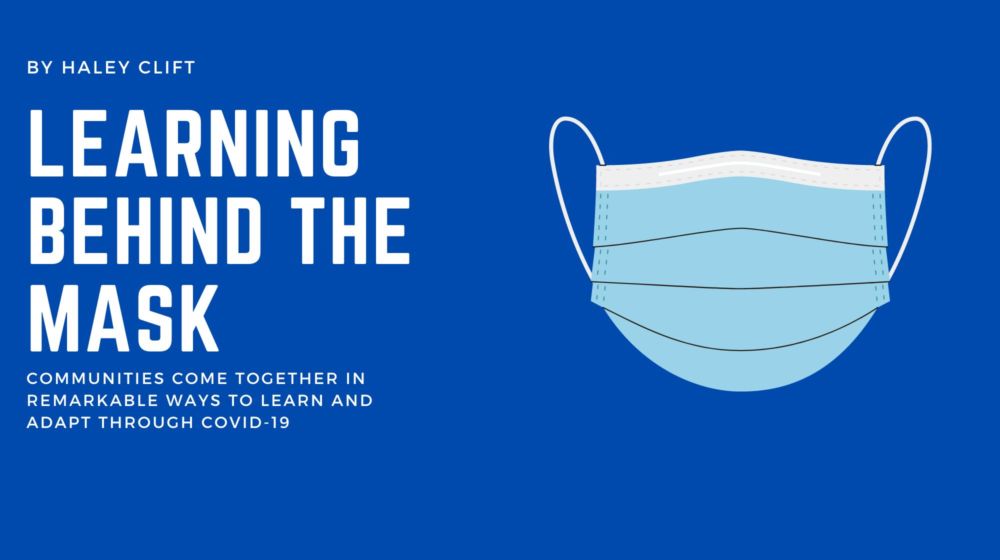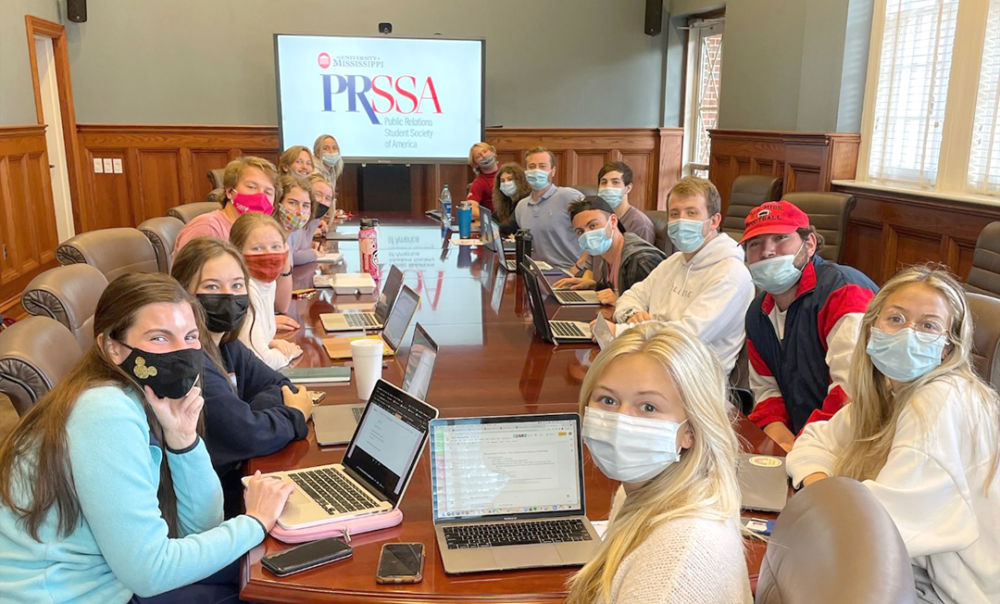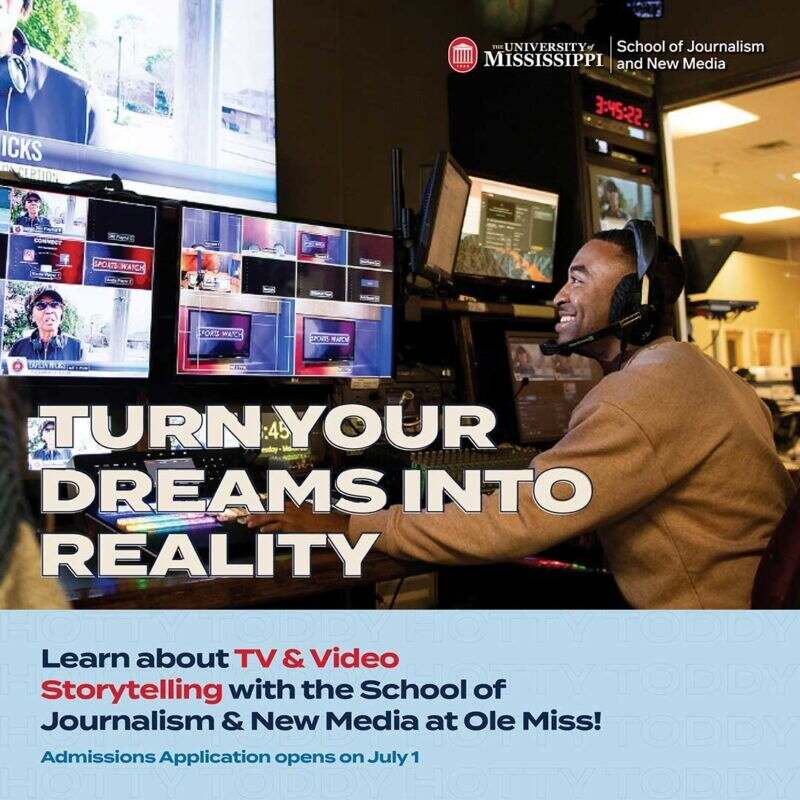It has been two years since Ole Miss students were sent home, in-person classes were moved online and COVID-19 was declared a global pandemic. There have been challenging moments, deep sorrow over lives lost and moments of social disconnect. Nonetheless, communities have come together in remarkable ways to learn how to adapt and reconnect.
Integrating technology into classrooms has provided opportunities for students to learn beyond the traditional classroom setting and instantly connect with anyone, anywhere and at any time. The enhanced learning environment inside and outside the classroom has provided interactive experiences and intentional education. The combination of in-person, virtual, and hybrid appears to be conditioning students for the technologically-dependent world they live in today. The current student generation should be better equipped, more resilient, and more prepared to face whatever communication challenges and experiences should come because of the skills learned by communicating online.
Video conferencing, for example, has served a variety of purposes and enhanced learning because people have been able to virtually connect from across the globe with their peers, co-workers, and family members. Students meet inspiring speakers from their field on a Zoom call that they may not otherwise have had the chance to meet if they were in a traditional, everyday classroom setting. Throughout the school year, many professors, club leaders and organizations invite alumni and guest speakers to speak on Zoom.
Jacqueline Cole is a junior integrated marketing communications major from Memphis, who enrolled at Ole Miss in Fall 2019. Cole reflected and compared her experiences before and through the pandemic.

The graphic reads: Learning Behind the Mask: Communities come together in remarkable ways to learn and adapt through COVID-19
“We didn’t video-conference in our classes or anything before the pandemic,” Cole said. “But now, it’s a regular thing that I look forward to in many of my classes and clubs. Last semester, we had an influencer reach out to my internet marketing class. The influencer, Sara Caroline Bridgers, actually went to Ole Miss. She now lives in Hawaii, and we were able to talk to her about how she became an influencer, how she makes money, and how to promote a self-brand.”
Remote opportunities have also provided many options for students in terms of learning and future possibilities for flexibility in the workforce. It has been to the advantage of students to learn more about the latest opportunities that have emerged in the past few years.
“I can go beyond what I have always known because I have the idea now that you can work remotely from everywhere. So, I don’t feel like I have to be stuck in one city,” Cole said. “I could definitely move around and have the opportunity to work for the same company, and my life wouldn’t be affected because I had to move to a different location for another job. I feel like this [opportunity] has definitely opened up since COVID.”
Since returning to campus this school year, Cole has noticed the empathy of her professors. She feels like her health is a priority. When Cole has to miss class for being sick, she knows she can rely on her professors to work with her outside of class to make up her work. She feels less pressured to constantly show up for class when she is not feeling well.
“The teachers have become more understanding,” Cole said. “I have noticed that the teachers take more time and are a lot more caring about out-of-class circumstances. When students are sick, Zoom options for students make things healthier, especially for someone who gets sick all the time. I never feel like I’m missing something anymore.”
As the world is evolving at an extremely fast technological pace, The University of Mississippi is growing with it. The University has employed several initiatives to help students continue to learn and prevent learning gaps.
“I have been able to connect with people despite the literal communication gaps,” Cole said. “I think the pandemic has helped the world, as a whole, communicate.”
Students can pursue and balance their passions and hobbies with their academics when flexibility is built in by a remote schedule. Combining traditional and virtual procedures where necessary, timely, and convenient helps the day-to-day tasks flow more smoothly. The developments from the past few years, such as online advising, virtual tours and virtual speakers, should remain because they are efficient and informative.
Dawson Wilson is a senior majoring in integrated marketing communications from Ocean Springs. He is the current director of photography for UM Square Magazine and was the 2020-2021 photo editor for The Ole Miss yearbook. Wilson also shoots freelance photography.
“Ever since COVID hit two years ago, I have learned just how much better of a learner I am when I take online and pace-yourself classes,” Wilson said. “I am a photographer, so this gave me leeway to really hone in on my craft while also being able to do school on my own time. I ended up finding the perfect balance of work, school, and play.”
The novelty of the technology and circumstances at hand proves there is no true expert in the room–or on the Zoom. However, this is how and where great ideas can be born and developed. Students are navigating, growing, and learning during a highly confusing time when much of the world is trying to do the same.
“I feel like going through all of this and knowing what I know now, the basic message that I have learned is just to live your life,” Wilson said. “If you don’t do it, your mind will eat away at you with the ‘what-ifs,’ but if you do it and don’t like it, then you have the ‘well, at least I tried it’ mindset.”
Wilson went on to say, “I think that whenever something major like this happens, technology will always advance to make things easier for us. As much as I think I remember the internet being super popular before the pandemic, it, no doubt, got much more popular during and after COVID. A big thing that people learned is how easy it is to find inspiration and a passion, while also being able to monetize that passion. At the beginning of the pandemic, when people were making small businesses in their homes with their stimulus checks, they realized how much the internet could open the world to everyone.”

The University of Mississippi PRSSA chapter members in masks.
The world is more than what students have known thus far, in terms of location or opportunity. With the world becoming more technologically advanced, each generation must refine their online communication skills. Integrating technology into the classroom has helped college students navigate the complexities of communicating professionally and socially.
“I was literally blown away when Kara Brand, who worked at Vogue, told us her story in our Square Magazine virtual meeting one day,” Wilson said. “The story was that she had graduated from Ole Miss and decided to move to New York. She worked for the MET Museum, where she worked the MET Gala annually.
“One year, she met the editor-in-chief of Teen Vogue, and she was offered a job on the spot. From there, she moved to L.A. to work for Teen Vogue, where she eventually ended up landing a job at Vogue in New York City. That is the short story, but I was so fascinated by her and her luck. I definitely do not think we would have gotten to hear from her if we had not had the pandemic.”
Elena Ossoski is a sophomore pursuing degrees in education and integrated marketing communications with an emphasis in public relations. Ossoski currently serves as editor-in-chief of UM Square Magazine, where she works with a team of directors to lead the staff. The staff worked together to publish the first volume of the student-run fashion magazine during the pandemic.
The pandemic provided an opportunity for reflection, outreach, and creativity for Ossoski and the magazine staff. Since UM Square Magazine posts weekly content online, including social media and blog posts, the team members could still contribute to story-telling, despite obstacles put in place by the pandemic.
“I’ve been able to form connections and relationships with people through social media and email, whether they are professional or friendships, even with people I haven’t met in person,” Ossoski said. “I would reach out to alumni, fellow students, and just people I thought were cool. Since it was during the pandemic, most people I interviewed I haven’t met in person. I would form relationships and share the stories through Square.”
“It has been very rewarding,” Ossoski said.
Social media became a direct reflection of what people were craving during the pandemic. Society had been missing out on normalcy: students wanted to know what everyone else was doing daily, so students constantly watched everyone post about it online. Students longed to be with each other.
“There’s so much knowledge that you can share from one person to another,” Ossoski said. “You can share someone’s life experiences, what they did that day, what they did at school, what they choose to wear each day–it’s a very intimate way to get to know somebody–and it also happened during the pandemic, when we also weren’t able to meet face-to-face, so it was just nice to hear about how other people lived their lives and share about these experiences on social media and on the blog. It just gave more insight to life in general.”
Social media and blogs became an outlet to get to know each other. Students desire human connection. Sometimes, you need that “push” from someone who has done something slightly scary before you; deep down, you know it will be okay, but when you hear a story from an inspiring individual who has “made it,” it motivates you. Social media provided that extra level of connection during that time of disconnection that allowed our generation to reach out instantly and take that leap of faith that students otherwise may not have been brave enough to take.
This story was written by By Haley Clift.
To read more stories from The Review: https://issuu.com/mrmagazine123/docs/the_review_all_pages_final
To learn more about our programs: https://jnm.olemiss.edu/
To follow our school on social media @umjourimc: https://linktr.ee/umjourimc
Apply now: https://bit.ly/36t5f3l
Tags: COVID, covid-19, education, feature, journalism, Oxford, pandemic, University of Mississippi, University of Mississippi School of Journalism and New Media"come" - Google News
July 25, 2022 at 11:30PM
https://ift.tt/lfnhvuY
Learning Behind the Mask: Communities come together in remarkable ways to learn and adapt through COVID-19 - School of Journalism and New Media - Ole Miss
"come" - Google News
https://ift.tt/ryovF0U
Shoes Man Tutorial
Pos News Update
Meme Update
Korean Entertainment News
Japan News Update
Bagikan Berita Ini















0 Response to "Learning Behind the Mask: Communities come together in remarkable ways to learn and adapt through COVID-19 - School of Journalism and New Media - Ole Miss"
Post a Comment